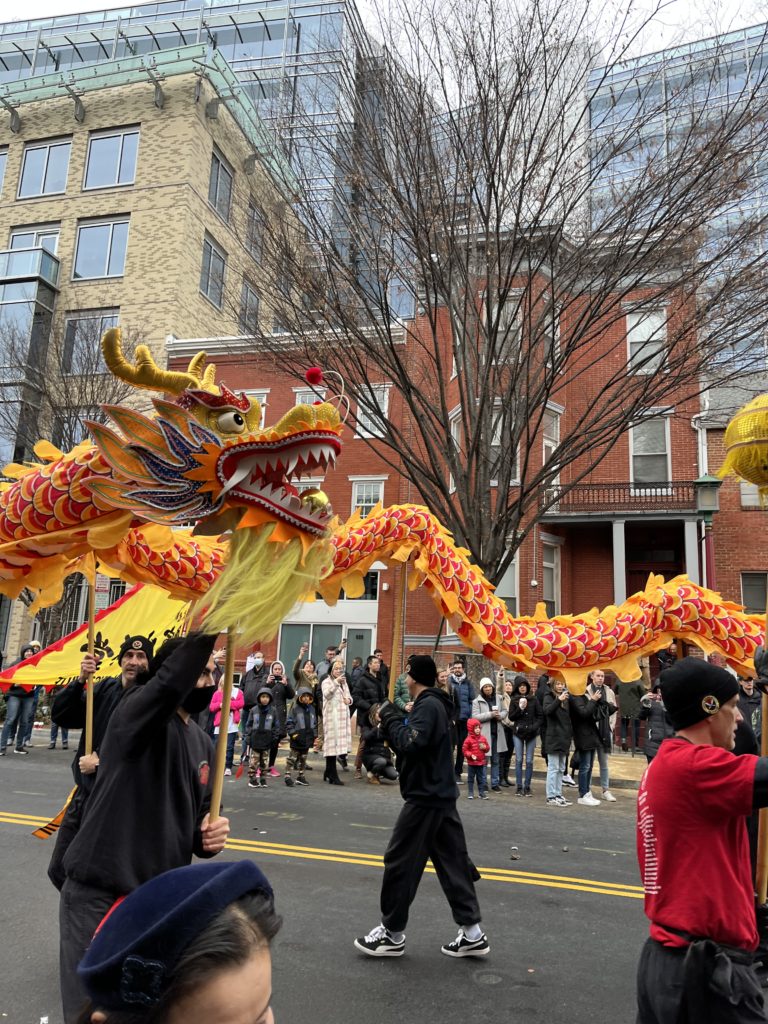2023 Downtown DC Lunar New Year Parade. Photo by Theodora Lawson.
Progress in Asian American representation in Hollywood is overshadowed by a spike in hate crimes. DC and GW Respond.
On Jan. 22, 2023, the annual Lunar New Year Parade took to the streets of Washington. Dancers captivated onlookers in dragon and lion costumes as Miss Chinatown waved to her audience from her horse-drawn carriage. Onlookers watched as a sea of red, the traditional Chinese color for good fortune, marched through the streets of DC’s Chinatown to the youthful drumbeats of the Ballou High School Marching Band and the Excel Academy All Girls Drum Line Band. Further contributors and parade participants are listed here.
Attending the Chinese New Year Parade was my first time visiting DC’s Chinatown, a neighborhood bursting with sushi restaurants and antique shops to satisfy a tourist’s wildest dreams. Standing at the corner of 6th and I St., I had an unobscured view of the celebration: an immersion into Chinese-American culture that I hadn’t experienced before.
But in celebrating the New Year, it’s important that we not only acknowledge the commencement of 2023 as the Year of the Rabbit but yet another year that the United States faces an increase in hate crimes, specifically those targeted towards Asian Americans. The highly anticipated Oscar nominations released on Jan. 24 for Everything Everywhere All At Once, a film led by an Asian American cast, was supposed to be a moment of recognition for Asian American actors who have historically faced a lack of representation in Hollywood. Collecting an impressive eleven nominations, including best picture, the film’s success was outshined by the shooting at a Lunar New Year celebration two days before in Monterey, California. When this achievement in Asian representation is forced to follow the massacre of what Reuters refers to as “one of California’s bloodiest mass shootings,” progress starts to feel like a never-ending cycle of one step forward and two steps back. As a GW student, I’ve looked at important community groups in the DC Metro area fighting against racism and Asian hate, along with promising legislation making its way through congress and the response of GW community leaders.
Recent racially motivated killings continue to threaten and counteract the progress in tolerance, racial equality, and recognition our communities strive to make toward Asian American citizens. The shooting at Monterey park on Jan. 22, a prominent hub for the Chinese community in Southern California, killed ten people and left another ten wounded, curtailing what had previously promised to be a days-long celebration of the Lunar New Year. A rise in Anti-Asian hate crimes follows rhetoric over the past three years in the United States that has blamed the spread of Covid-19 on the Asian American population, resulting in attacks ranging from verbal harassment to physical assault. Back in DC, President Biden released a statement following the recent attack in Monterey as a “senseless attack” on the AAPI (Asian American Pacific Islander) community. But condolences can only go so far when gun violence and hate crimes continue to spread through California and the world.
Award season is upon us as Americans ready for the 95th annual Oscar Academy Award Show screening on March 12. Among the most talked about films is Everything Everywhere All At Once, Directed by Daniel Kwan and Daniel Schinert and featuring prominent Asian actors, including Michelle Yeoh and Ke Huy Quan. In 2015, the #OscarsSoWhite tag spread through the internet and lit a fire under the Academy to diversify its membership and the slate of actors and actresses nominated for rewards.
This year, seven actors of color received nominations for their memorable roles. With the release of Everything Everywhere All At Once in March of 2022, the press tour for the movie revealed a growing concern for not only a lack of Asian representation. Ke Huy Quan articulates in an interview with Scripps News further addresses this lack of representation with the industry’s tendency to use “yellowface” makeup and prosthetics so that the few roles for Asian characters still go to white actors. In an NPR interview, actress Stephanie Hsu, who plays the daughter of Yeoh and Quan in the film, expresses how actors like her onscreen parents have paved the way for her career. She addresses how the film’s release is another step forward in Asian representation in Hollywood when recalling Michelle Yeoh’s achievement of being first on the call sheet (i.e. the films leading star) and Ke Huy Quan’s triumphant return to the big screen after twenty years of retirement due to a lack of roles. Hsu attributes a sense of intergenerational healing for Asian Americans following the recognition and praises the movie has received.
The Stop AAPI Hate initiative is an advocacy group that seeks stronger human and civil rights legislative protections while combating discrimination and bigotry that ravages AAPI communities. It was created as a coalition between the AAPI Equity Alliance, Chinese for Affirmative Action (CAA), and the Asian American Studies Department of San Francisco State University in march of 2020 in response to an increase in hate crimes and violent bigotry against Asian Americans as a result of the Covid-19 pandemic. Their website contains resources for reporting hate incidents, the latest news and reports on Asian hate crimes, and, most recently, a donations page for the victims of the Monterey Park shooting.
Back in Washington, promising legislation for AAPI equity makes its way through Congress. On Jan. 17, the Whitehouse released a statement introducing the “National Strategy to Advance Equity, Justice, and Opportunity for Asian American, Native Hawaiian, and Pacific Islander Communities”. The initiative seeks to build upon Biden’s Executive Order 14031 from May of 2021 as the Biden-Harris administration continues to address anti-Asian discrimination and the needs of AAPI communities. The White House’s broader agenda toward equity can be found here.
GW released a statement on Jan. 29 titled Violence in the Nation and Pain in our Community, in which President Mark S. Wrighton addresses the recent mass shootings of the Asian American community. In acknowledgment of increased trauma and the role of GW as an institution of higher learning to address such injustices, Wrighton links various helpful resources for community members. These include the Office of Diversity, Equity, and Community Engagement and Counseling and Psychological Services.
The prevalence of hate crimes and gun violence continues to spread in the United States. In the wake of yet another senseless massacre, we must ask ourselves how many times we can ride this merry-go-round of sending our condolences and prayers to afflicted communities while sitting idly by as Congress refuses to pass stricter legislation on gun violence.
Everything Everywhere All At Once tells a similar story of trauma, but one rooted in the struggles of depression in society and the hunt for the American Dream as the Wang family fights to keep the doors of its family-run laundromat open. This absurdist and whimsical fantasy film seeks to address the meaninglessness and nihilistic tendencies of our world, a theme that touches only too close to home with this most recent massacre in the Asian American community of Monterey Park.
U.S. Rep. Judy Chu (D-Calif.) is among the community leaders and figures of hope that have emerged during these difficult times. The representative of California’s 28th District points to its resilience as a community with her unifying message that she hopes will be headed by many: we can get through this together.


